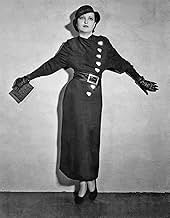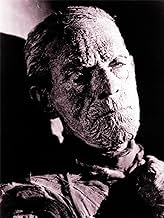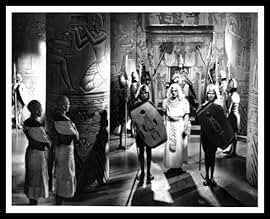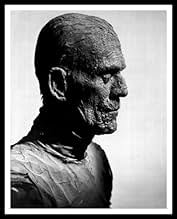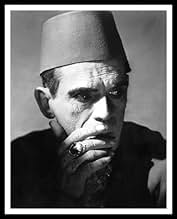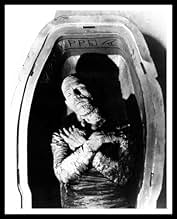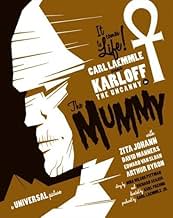PUNTUACIÓN EN IMDb
7,0/10
31 mil
TU PUNTUACIÓN
Una momia egipcia busca en El Cairo a la chica que cree que es su princesa perdida.Una momia egipcia busca en El Cairo a la chica que cree que es su princesa perdida.Una momia egipcia busca en El Cairo a la chica que cree que es su princesa perdida.
- Premios
- 1 premio y 4 nominaciones en total
Henry Victor
- The Saxon Warrior
- (escenas eliminadas)
Arnold Gray
- Knight
- (escenas eliminadas)
Florence Britton
- Nurse
- (sin acreditar)
Jack Deery
- Party Guest
- (sin acreditar)
Bill Elliott
- Party Guest
- (sin acreditar)
Leyland Hodgson
- Gentleman #2 at Cairo Party
- (sin acreditar)
Eddie Kane
- Inspector's Assistant
- (sin acreditar)
Tony Marlow
- Police Inspector
- (sin acreditar)
Argumento
¿Sabías que...?
- CuriosidadesUnlike the other Universal classic monsters, the other Mummy movies have no direct relation to this one. The other films feature a different mummy, named Kharis, who is resurrected by tana leaves to be controlled by a modern person (similar to a voodoo zombie). La mano de la momia (1940) reuses footage from this film, but changes Imhotep to Kharis. It was Kharis who would appear in the other Universal and Hammer films. Imhotep wouldn't reappear in theaters until The Mummy (La momia) (1999).
- PifiasImhotep has been sentenced to "the Nameless Death", yet his name is still inscribed on his coffin. The ancient Egyptians had chisels and should have been able to destroy the glyphs on the coffin that make up Imhotep's name, but it is untouched when his mummy is found.
- Citas
[Norton laughs manically after seeing the Mummy leave the archaelogists' workshop with the sacred scroll]
Sir Joseph Whemple: What's the matter, man? For heaven's sake, what is it?
Ralph Norton: He went for a little walk! You should have seen his face!
- Créditos adicionalesThe credit begins over a rotating model of the Pyramids' site, then the main title 'The Mummy' is made with 3D rock letters on the side of a pyramid.
- ConexionesEdited into La mano de la momia (1940)
- Banda sonoraMisterioso
(uncredited)
Composer unknown
Precedes "Swan Lake" during opening credits
Reseña destacada
What director Karl Freund achieves in this movie is nothing short of staggering, even at a remove of nearly 70 years. If this same story, with this same basic approach, were released today, it would still be great. And especially now, when the box office successes of such movies as The Sixth Sense, What Lies Beneath and The Blair Witch Project demonstrate that audiences are hungry for a return to the classic horror virtues of style, mood and suspense (as opposed to the tired formula of gore, in your face shocks, special effects, and more gore) The Mummy would seem ripe for some kind of revival (too bad the lame Brendan Fraser vehicle has stolen its title - though nothing of its wit, skill, or conviction).
What makes this movie so good is. . . gosh, there are so many things! Start with the creepy and unsettling tone, which the movie establishes right away. The very first scene - where the Mummy is awakened - is one of the greatest ever for pure atmosphere and chills. Look at the way Freund *under* plays it, every step of the way. Instead of piling on a crescendo of "scary" music and using odd or distorted camera angles to dramatize the situation, he has the action play out in total silence and with a resolutely still camera, the tasteful cut-aways (from the mummy in the tomb to the archaeologist sitting not five feet away) being the only frill. The tension which results is unsettlingly powerful - and is made moreso by the fact that the scene refuses to resolve itself in the way which we expect it to. I'll give no more details, but when you watch the film, ask yourself: isn't *this* resolution ten times more creepy and effective than the one we thought we saw coming. Already, five minutes in, it's clear that The Mummy has a far more wicked, sophisticated sense of horror than any of the other big "monsters" of the day (Dracula, Frankenstein, Wolf Man, etc.) - and a good deal more than many that have come after, too.
But of course, all the style in the world ultimately cannot save a weak or hackneyed script. And so it's a great pleasure to report that all of Freund's technical finesse is at the service of a really super cool story. Not content to be merely a spooker, the film is also - nay, one might even say primarily - a tragic love story: one that deals intelligently with such provocative notions as forbidden love, reincarnation, religious desecration, inhuman torture, and a strong sub-theme of the desire to respect the past vs. the need to live for the moment. All of these elements swirl so ingeniously and non-didactically in The Mummy's streamlined storyline, that I'm tempted to proclaim this at once both the most compact, as well as the most ambitious, horror movie script I have ever come across.
Of course, such superlatives can get you in trouble too, so let me add that yes, there are flaws - mainly the ones endemic to all horror movies of the time. The so-called "hero" is once again a young man of no charm or interest whatsoever. Meanwhile, the venerable old "expert" who must explain the ways of the monster to everyone else is already a tired convention at this point - and since the role here is played by Edward Van Sloan (who was Van Helsing in the original "Dracula" and its sequel "Dracula's Daughter", as well as Dr. Waldman in "Frankenstein") there is an even greater than usual sense of perfunctoriness to the undertaking. However, even here the movie displays its strength and uniqueness by toying with our expectations of what these stock characters will be able to do and achieve. Whereas in most other horror films, the romantic lead and the crusty old doctor end up being the white knights who vanquish the monster and save the girl, here they operate on a much less exalted plane - and are thereby made more human in the process.
As for faults, that's pretty much it. The pace is masterful; some have called it slow, but I strongly disagree. The film flows naturally and inevitably, with every scene building upon the one before it. There's nothing extraneous in the way it unfolds - achievement enough when compared to the countless other horror movies of its day. As an added treat, there is a flashback sequence in the middle of the movie that is a mini-masterpiece all by itself: it has all the fury and grandeur of a D.W. Griffith silent, honed and encapsulated down to its bare essence. It tells the tale of the title character's previous life with an economy and precision that could still serve as a model for filmmakers today. And, well, most of all, the movie has. . . Boris Karloff.
I've restricted my discussion of him until the end because his towering greatness is so routinely accepted and understood that it's almost redundant to comment upon it. Also, I wanted to make clear that, though he is the film's chief asset, he is far from its only one. But there's no question that it is his stately, brooding, menacing performance that ultimately pushes this film over into the realm of greatness. The key thing here is this: while the concept of a centuries-old being raised from the dead and out for vengeance is a great *idea*, Karloff's portrayal is what gives it tangible, terrifying REALITY. Observing this man - with his stiff ramrod posture, his measured and stately movements, and his absolutely hypnotic voice - we are truly convinced, on a visceral level, that yes here indeed is the walking dead. That kind of verisimilitude is rare enough in horror movies of any era, and its presence here stands as an absolute revelation. Just as does the entirety of this wonderful, exquisitely made film.
What makes this movie so good is. . . gosh, there are so many things! Start with the creepy and unsettling tone, which the movie establishes right away. The very first scene - where the Mummy is awakened - is one of the greatest ever for pure atmosphere and chills. Look at the way Freund *under* plays it, every step of the way. Instead of piling on a crescendo of "scary" music and using odd or distorted camera angles to dramatize the situation, he has the action play out in total silence and with a resolutely still camera, the tasteful cut-aways (from the mummy in the tomb to the archaeologist sitting not five feet away) being the only frill. The tension which results is unsettlingly powerful - and is made moreso by the fact that the scene refuses to resolve itself in the way which we expect it to. I'll give no more details, but when you watch the film, ask yourself: isn't *this* resolution ten times more creepy and effective than the one we thought we saw coming. Already, five minutes in, it's clear that The Mummy has a far more wicked, sophisticated sense of horror than any of the other big "monsters" of the day (Dracula, Frankenstein, Wolf Man, etc.) - and a good deal more than many that have come after, too.
But of course, all the style in the world ultimately cannot save a weak or hackneyed script. And so it's a great pleasure to report that all of Freund's technical finesse is at the service of a really super cool story. Not content to be merely a spooker, the film is also - nay, one might even say primarily - a tragic love story: one that deals intelligently with such provocative notions as forbidden love, reincarnation, religious desecration, inhuman torture, and a strong sub-theme of the desire to respect the past vs. the need to live for the moment. All of these elements swirl so ingeniously and non-didactically in The Mummy's streamlined storyline, that I'm tempted to proclaim this at once both the most compact, as well as the most ambitious, horror movie script I have ever come across.
Of course, such superlatives can get you in trouble too, so let me add that yes, there are flaws - mainly the ones endemic to all horror movies of the time. The so-called "hero" is once again a young man of no charm or interest whatsoever. Meanwhile, the venerable old "expert" who must explain the ways of the monster to everyone else is already a tired convention at this point - and since the role here is played by Edward Van Sloan (who was Van Helsing in the original "Dracula" and its sequel "Dracula's Daughter", as well as Dr. Waldman in "Frankenstein") there is an even greater than usual sense of perfunctoriness to the undertaking. However, even here the movie displays its strength and uniqueness by toying with our expectations of what these stock characters will be able to do and achieve. Whereas in most other horror films, the romantic lead and the crusty old doctor end up being the white knights who vanquish the monster and save the girl, here they operate on a much less exalted plane - and are thereby made more human in the process.
As for faults, that's pretty much it. The pace is masterful; some have called it slow, but I strongly disagree. The film flows naturally and inevitably, with every scene building upon the one before it. There's nothing extraneous in the way it unfolds - achievement enough when compared to the countless other horror movies of its day. As an added treat, there is a flashback sequence in the middle of the movie that is a mini-masterpiece all by itself: it has all the fury and grandeur of a D.W. Griffith silent, honed and encapsulated down to its bare essence. It tells the tale of the title character's previous life with an economy and precision that could still serve as a model for filmmakers today. And, well, most of all, the movie has. . . Boris Karloff.
I've restricted my discussion of him until the end because his towering greatness is so routinely accepted and understood that it's almost redundant to comment upon it. Also, I wanted to make clear that, though he is the film's chief asset, he is far from its only one. But there's no question that it is his stately, brooding, menacing performance that ultimately pushes this film over into the realm of greatness. The key thing here is this: while the concept of a centuries-old being raised from the dead and out for vengeance is a great *idea*, Karloff's portrayal is what gives it tangible, terrifying REALITY. Observing this man - with his stiff ramrod posture, his measured and stately movements, and his absolutely hypnotic voice - we are truly convinced, on a visceral level, that yes here indeed is the walking dead. That kind of verisimilitude is rare enough in horror movies of any era, and its presence here stands as an absolute revelation. Just as does the entirety of this wonderful, exquisitely made film.
- krumski
- 9 ago 2001
- Enlace permanente
Selecciones populares
Inicia sesión para calificar y añadir a tu lista para recibir recomendaciones personalizadas
Detalles
Taquilla
- Presupuesto
- 196.000 US$ (estimación)
- Recaudación en todo el mundo
- 58 US$
- Duración1 hora 13 minutos
- Color
- Relación de aspecto
- 1.37 : 1
Contribuir a esta página
Sugerir un cambio o añadir el contenido que falta

Principal laguna de datos
By what name was La momia (1932) officially released in India in English?
Responde

